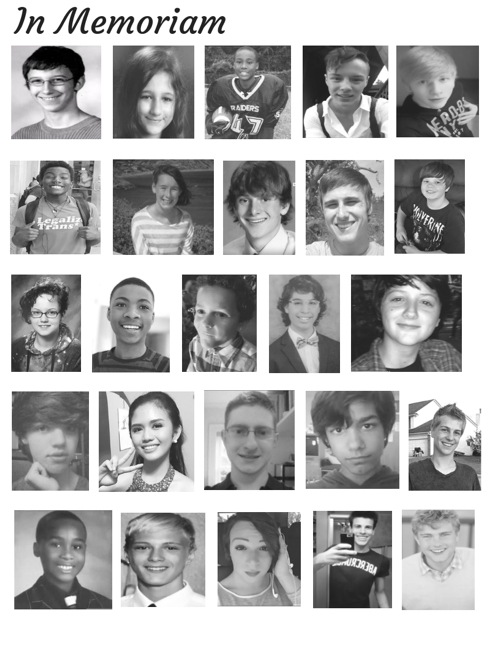
Oct 10, 2019 12:00:00 AM
by Brett Bigham
Every single teacher reading this needs to come out today.
You straight teachers might be asking yourself, “Who me?”
Yes, you. [pullquote]I want you to come out today as an ally.[/pullquote]
I invite you to stand at your desk and say, “It is National Coming Out Day, and even though I am straight, I want to come out and say that I have taught LGBTQ students before and I respected them and encouraged them as much as I possibly could. I will do the same this year, and next year and for the rest of my career.”
Woah. That is quite the ask—I know. But after you do that, you can go back to your regularly scheduled school day.
For LGBTQ teachers, however, it is not quite so easy. Many of you know my history, but for those who don’t, know I was named Oregon Teacher of the Year and then called by my supervisor and told to shut my mouth. I was told that if I said I was gay, I would be “shot in the head.” “I mean it, someone will kill you if you don’t shut up,” followed.
What would follow was a year of torture as my district tried first to silence me, and then fired me as I fought their orders. It would end with a state investigation and the firing of my superintendent, the removal of the head of special education, the firing of my supervisor and reprimands down much of the chain of command—and I was reinstated. There is a Wikipedia page about it if you want all the details, but that is a quick overview.
If you want to understand that on a more personal level, I’m the gay teacher who was going to meet with high school students to discuss teen suicide prevention but was told by my district I could not attend. The reason? The district had evaluated my request and decided meeting with these students had “no value to the district.” I took a personal day and went anyway, so my district tried to hunt me down.
And that is why I am asked about coming out at work. If a teacher in the most liberal voting city in the United States can go through something like this, imagine what can happen in places where there are no protections for LGBTQ people. Last year in Illinois, a teacher received flowers and when students asked who they were from he said, “My husband." As that story hit the news, the Chicago Tribune interviewed me to give advice to LGBTQ teachers. I have thought long and hard about this.
[pullquote]Do I tell people to come out of the closet, knowing that there are supervisors—just like my past supervisor—who are waiting to attack them?[/pullquote] Knowing that there are school districts like mine that would lie to the press and manufacture data to smear a teacher who has done nothing wrong?
I don’t say that lightly, but I saw—first hand—the school district’s lack of moral compass. Part of my complaint was that my supervisor was having her wine-of-the-month club shipped to the school, where she kept it on her office shelf. She demanded my students start cleaning her office and I refused. When asked by the school’s investigator about this I told him, “I cannot have my students around liquor.”
Because of this, my superintendent demanded I attend multiple weekly counseling sessions for my lying. The lie I had told? She looked me in the eye and said, “Wine is not distilled, and therefore it is not considered liquor.” My union representative attended that meeting with me and gasped when he heard these words.
I walked out of the meeting, filed state and federal complaints and went to war.
So how do I send a teacher into that firing line? I was asked just last week by a first-year teacher what he should do. Like in the Chicago Tribune article, I told him to really think it through. That there could be a price to pay.
But this week has changed things for me.
On Tuesday, in a case being argued at the United States Supreme Court, the Southern Poverty Law Center provided an amicus brief that used my ex-school district’s harassment and discrimination against me as an example, in the highest court of the land, of workplace injustice against LGBTQ Americans.
To be a part of this argument, at this level of government, has been proof to me that standing firm and fighting the good fight was the right choice. The fact that my union stood up, right beside me and at great expense, showed me they valued me as a teacher and wanted to keep me in the classroom.
And that gets to me the entire reason I had to write this piece.
On Wednesday, I was working on my presentation for this weekend’s NEA LGBTQ Caucus conference in Las Vegas. I’ll be presenting with the Education Civil Rights Alliance (ECRA) about the rights of marginalized students.
I needed a picture of LGBTQ youth for a slide, so I did a Google search.
“LGBT youth”
And suddenly my screen was populated by picture after picture of suicides. Ten-year-olds, 12-year-olds, middle school kids and high schoolers. Face after beautiful face.

Those kids are gone because they did not see a future worth living. You can and will be an example of what their future could be.
It’s National Coming Out Day, show those kids they are not alone.
Brett Bigham is the 2014 Oregon State Teacher of the Year and a member of the National Network of State Teachers of the Year. He is the only Oregon special education teacher to be named Teacher of the Year and to win the NEA National Award for Teaching Excellence. He is the creator of Ability Guidebooks, a series of support books for people with autism that give step-by-step directions how to visit cultural landmarks and social events. The books are currently available in 10 countries and four languages. He is president of ORSTOY, the Oregon chapter of the National Network of State Teachers of the Year and serves on the boards of Oregon Safe Schools and Clubfunder.Org.
Few issues in education spark more tension and debate than standardized testing. Are they a tool for equity or a burden on students? A necessary check on school systems or a flawed measure of...
Charter schools are public schools with a purpose. Operating independently from traditional school districts, they're tuition-free, open to all students, and publicly funded—but with more flexibility...
Despite the benefits of a diverse teaching force, prospective teachers of color fall out of our leaky preparation pipeline at every stage: preparation, hiring, induction, and retention. Here’s what...
Ed Post is the flagship website platform of brightbeam, a 501(c3) network of education activists and influencers demanding a better education and a brighter future for every child.
© 2020-2025 brightbeam. All rights reserved.
Leave a Comment